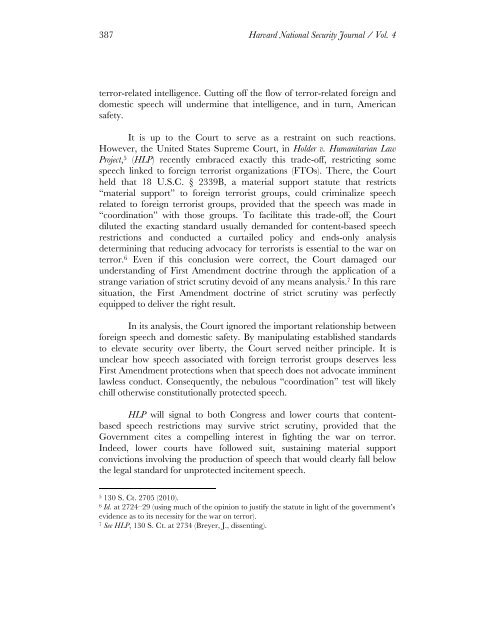Vo.4-Moshirnia-Final
Vo.4-Moshirnia-Final
Vo.4-Moshirnia-Final
You also want an ePaper? Increase the reach of your titles
YUMPU automatically turns print PDFs into web optimized ePapers that Google loves.
387 Harvard National Security Journal / Vol. 4<br />
terror-related intelligence. Cutting off the flow of terror-related foreign and<br />
domestic speech will undermine that intelligence, and in turn, American<br />
safety.<br />
It is up to the Court to serve as a restraint on such reactions.<br />
However, the United States Supreme Court, in Holder v. Humanitarian Law<br />
Project, 5 (HLP) recently embraced exactly this trade-off, restricting some<br />
speech linked to foreign terrorist organizations (FTOs). There, the Court<br />
held that 18 U.S.C. § 2339B, a material support statute that restricts<br />
“material support” to foreign terrorist groups, could criminalize speech<br />
related to foreign terrorist groups, provided that the speech was made in<br />
“coordination” with those groups. To facilitate this trade-off, the Court<br />
diluted the exacting standard usually demanded for content-based speech<br />
restrictions and conducted a curtailed policy and ends-only analysis<br />
determining that reducing advocacy for terrorists is essential to the war on<br />
terror. 6 Even if this conclusion were correct, the Court damaged our<br />
understanding of First Amendment doctrine through the application of a<br />
strange variation of strict scrutiny devoid of any means analysis. 7 In this rare<br />
situation, the First Amendment doctrine of strict scrutiny was perfectly<br />
equipped to deliver the right result.<br />
In its analysis, the Court ignored the important relationship between<br />
foreign speech and domestic safety. By manipulating established standards<br />
to elevate security over liberty, the Court served neither principle. It is<br />
unclear how speech associated with foreign terrorist groups deserves less<br />
First Amendment protections when that speech does not advocate imminent<br />
lawless conduct. Consequently, the nebulous “coordination” test will likely<br />
chill otherwise constitutionally protected speech.<br />
HLP will signal to both Congress and lower courts that contentbased<br />
speech restrictions may survive strict scrutiny, provided that the<br />
Government cites a compelling interest in fighting the war on terror.<br />
Indeed, lower courts have followed suit, sustaining material support<br />
convictions involving the production of speech that would clearly fall below<br />
the legal standard for unprotected incitement speech.<br />
5 130 S. Ct. 2705 (2010).<br />
6 Id. at 2724–29 (using much of the opinion to justify the statute in light of the government’s<br />
evidence as to its necessity for the war on terror).<br />
7 See HLP, 130 S. Ct. at 2734 (Breyer, J., dissenting).
















